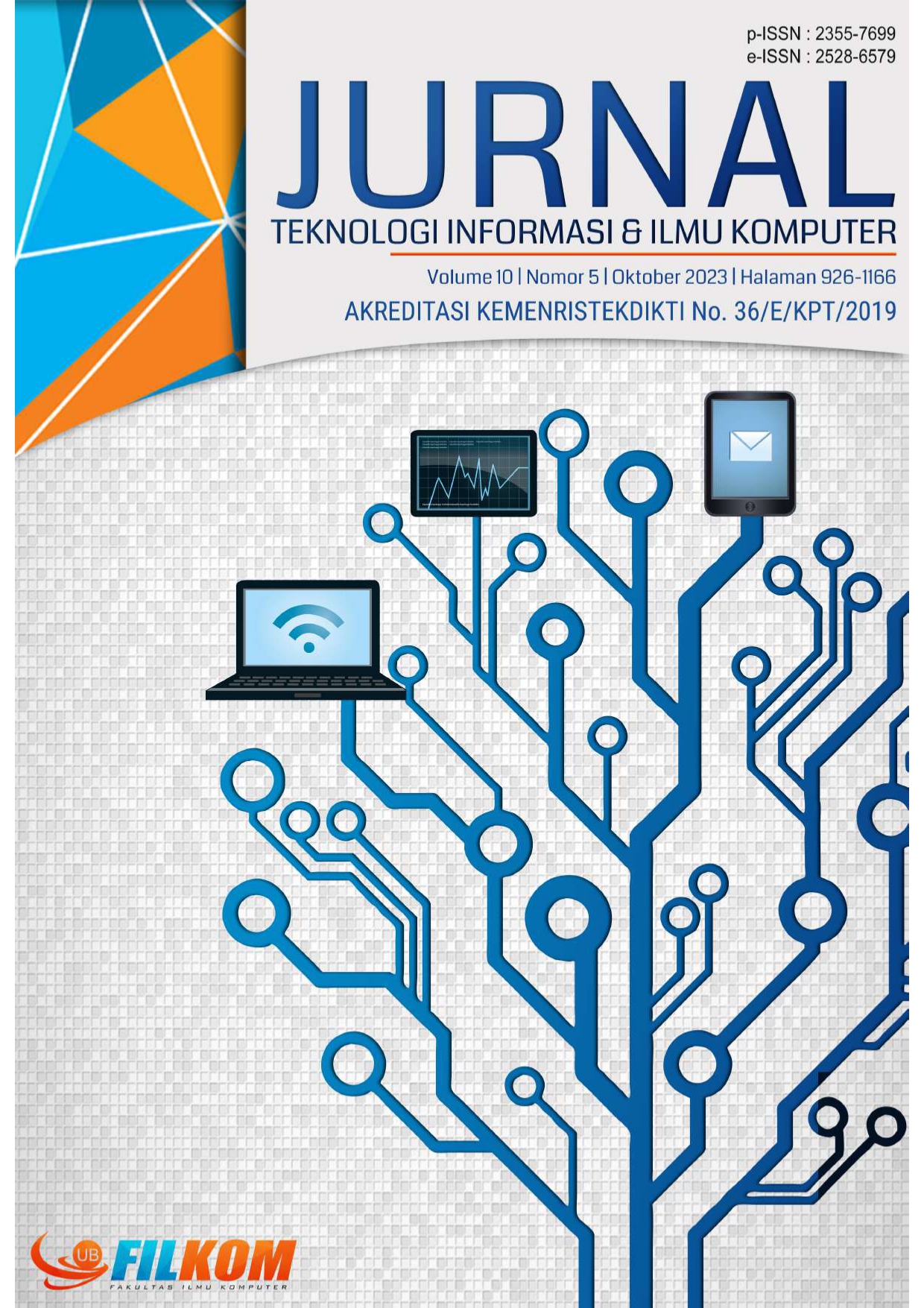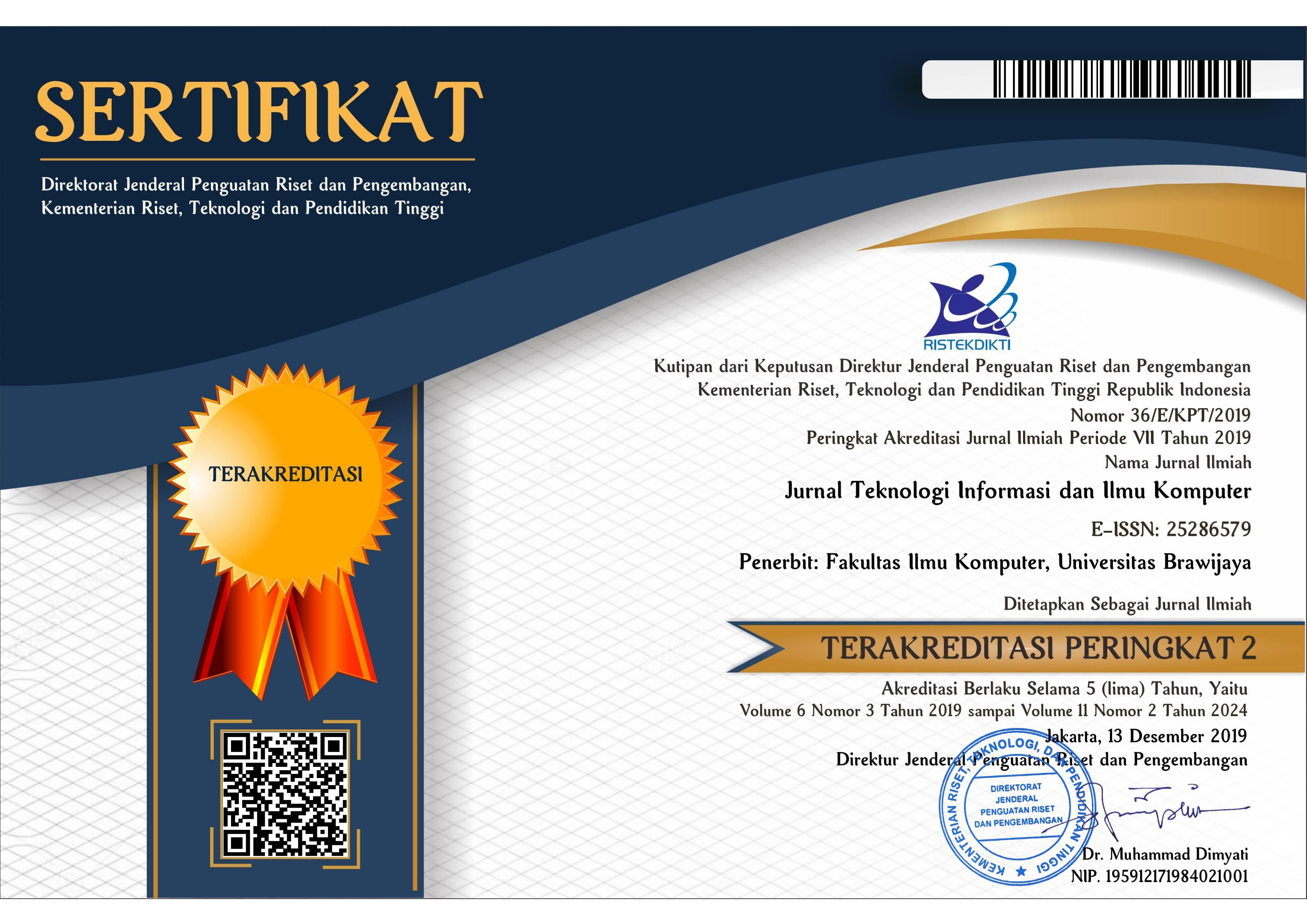Implementasi Algoritma AES 256 CBC, BASE 64, Dan SHA 256 dalam Pengamanan dan Validasi Data Ujian Online
DOI:
https://doi.org/10.25126/jtiik.2023106558Abstrak
Terdapat berbagai macam cara untuk melaksanakan ujian di tingkat perguruan tinggi, selama masa pandemi Covid-19 metode ujian online menjadi banyak digunakan. Meskipun ujian online dapat dilaksanakan di mana saja dan kapan saja, sayangnya masih banyak terjadi kecurangan seperti bocornya soal ujian, tersebarnya kunci jawaban secara ilegal, dan pengubahan pada data hasil ujian. Salah satu solusi dalam menjaga integritas hasil ujian berbasis online adalah mengenkripsi data ujian dengan metode kriptografi. Penelitian ini mengusulkan menerapkan beberapa metode kriptografi sebagai upaya dalam mengamankan dan memastikan keaslian data ujian online menggunakan algoritma AES 256 CBC, Base 64, dan SHA 256. Penelitian ini menghasilkan aplikasi ujian online berbasis website yang dibangun menggunakan teknologi MERN Stack. Hasil pengujian dalam memvalidasi data ujian online yang telah dienkripsi menggunakan sistem dan OpenSSL menunjukkan nilai hash yang sama. Hal ini menunjukkan sistem telah mampu mengenkripsi, mendekripsi, dan memvalidasi data ujian online dengan efektif.
Abstract
There are various ways to organize exams at the higher education level. During the Covid-19 pandemic, the online examination method has become widely used. Although online exams can be held anywhere and anytime, unfortunately, many violations and fraud exist, such as leaking exam questions, spreading answer keys illegally, and changing exam result data. One solution for maintaining the integrity of online-based exam results is to encrypt exam data with cryptographic methods. This study proposes applying several cryptographic methods to secure and ensure the authenticity of online exam data using AES 256 CBC, Base 64, and SHA 256 algorithms. This research resulted in a website-based online exam application built using MERN Stack technology. The test results in validating online exam data that has been encrypted using the system and OpenSSL show the same hash value. This shows that the system has been able to encrypt, decrypt, and validate online exam data effectively.
Downloads
Referensi
APREJA, A., SYARIF, Z. and IBRAHIM, A., 2017. ‘Analisis Tingkat Keamanan Enkripsi Data Menggunakan Algoritma Base 64 Endcode’, Computer Science and ICT, 3(1), pp. 49–50.
AZLIN, MUSADAT, F. and NUR, J., 2018. ‘Aplikasi Kriptografi Keamanan Data Menggunakan Algoritma Base64’, Jurnal Informatika, 7(2), pp. 1–5.
CÁDIZ, A. U. DE, BALDERAS, A. and CABALLERO-HERNÁNDEZ, J. A., 2021. ‘Analysis of Learning Records to Detect Student Cheating on Online Exams : Case Study during COVID-19 Pandemic’, in TEEM: Technological Ecosystems for Enhancing Multiculturality. Salamanca, Spain: Association for Computing Machinery, New York NY, United States, pp. 752–757. doi: 10.1145/3434780.3436662.
CAHYADI, A., 2020. ‘Covid-19 Outbreak and New Normal Teaching in Higher Education : Empirical Resolve from Islamic Universities in Indonesia’, Dinamika Ilmu, 20(2), pp. 255–266. doi: 10.21093/di.v20i2.2545.
DECKER, B., WINTERS, B. and MERCER, E., 2021. ‘Towards verifying SHA256 in OpenSSL with the software analysis workbench’, in NASA Formal Methods: 13th International Symposium, NFM 2021, Virtual Event, May 24–28, 2021, Proceedings. Springer, pp. 72–78.
DENDIR, S. and MAXWELL, R. S., 2020. ‘Computers in Human Behavior Reports Cheating in online courses : Evidence from online proctoring’, Computers in Human Behavior Reports, 2(October), p. 100033. doi: 10.1016/j.chbr.2020.100033.
FATHURRAHMAD, F., 2020. ‘Development And Implementation Of The Rijndael Algorithm And Base-64 Advanced Encryption Standard ( AES ) For Website Data Security’, International Journal of Scientific & Technology Research, 9(11), pp. 7–11.
FAUZIAH, N. A. et al., 2018. ‘Design and implementation of AES and SHA-256 cryptography for securing multimedia file over android chat application’, 2018 International Seminar on Research of Information Technology and Intelligent Systems, ISRITI 2018, pp. 146–151. doi: 10.1109/ISRITI.2018.8864485.
JIANLI, C., YONGDAO, S. and XIA, L., 2013. ‘The Research of Mobile phone Entrance Guard System Model based on the Encryption Two-dimensional Code’, TELKOMNIKA Indonesian Journal of Electrical Engineering, 11(9), pp. 5284–5292. doi: 10.11591/telkomnika.v11i9.3281.
JUNUS, K. et al., 2021. ‘Lecturer Readiness for Online Classes during the Pandemic : A Survey Research’, Education Sciences, 11, p. 139. doi: 10.3390/educsci11030139.
KAFFAH, F. M. et al., 2020. ‘E-Mail message encryption using advanced encryption standard (AES) and huffman compression engineering’, Proceedings - 2020 6th International Conference on Wireless and Telematics, ICWT 2020. doi: 10.1109/ICWT50448.2020.9243651.
KRISHNA, V. et al., 2016. ‘A Novel Image Encryption Algorithm using AES and Visual Cryptography’, in 2nd International Conference on Next Generation Computing Technologies (NGCT-2016).
KUMAR, T. M. and KARTHIGAIKUMAR, P., 2017. ‘FPGA implementation of an optimized key expansion module of AES algorithm for secure transmission of personal ECG signals’, Design Automation for Embedded Systems. doi: 10.1007/s10617-017-9189-5.
LIM, J. P., 2019 ‘Automatic Equivalence Checking for Assembly Implementations of Cryptography Libraries’, 2019 IEEE/ACM International Symposium on Code Generation and Optimization (CGO), pp. 37–49.
MANOHARAN, S., 2021. ‘On Individualized Online Assessments in STEM Subjects’, in 2021 IEEE International Conference on Engineering, Technology & Education (TALE), pp. 255–260. doi: 10.1109/TALE52509.2021.9678631.
MODUGULA, R. S. R., 2020. ‘A Hybrid approach for Augmenting password security using Argon2i hashing and AES Scheme.’ Dublin, National College of Ireland.
MOHAMMAD, H. M. and ABDULLAH, A. A., 2022. ‘Enhancement process of AES : a lightweight cryptography algorithm-AES for constrained devices’, TELKOMNIKA Telecommunication Computing Electronics and Control, 20(3), pp. 551–560. doi: 10.12928/TELKOMNIKA.v20i3.23297.
NOORBEHBAHANI, F. and MOHAMMADI, A., 2022. A systematic review of research on cheating in online exams from 2010 to 2021, Education and Information Technologies. Springer US. doi: 10.1007/s10639-022-10927-7.
PARK, M. et al., 2019. ‘Decrypting password-based encrypted backup data for Huawei smartphones’, Digital Investigation, 28, pp. 119–125. doi: 10.1016/j.diin.2019.01.008.
RACHMAWATI, R. et al., 2021. ‘Work from Home and the Use of ICT during the COVID-19 Pandemic in Indonesia and Its Impact on Cities in the Future’, Sustainability, (13), pp. 1–17. doi: 10.3390/su13126760.
RAHAYU, W., Dwirifqi, M. and PUTRA, K., 2022. ‘Development and validation of Online Classroom Learning Environment Inventory ( OCLEI ): The case of Indonesia during the COVID ‑ 19 pandemic’, Learning Environments Research, 25(1), pp. 97–113. doi: 10.1007/s10984-021-09352-3.
RAYAN, F. et al., 2021. ‘Results in Physics Analysis and challenges of robust E-exams performance under COVID-19’, Results in Physics, 23, p. 103987. doi: 10.1016/j.rinp.2021.103987.
VENKATARAMAN, N. L. and KUMAR, R., 2020. ‘An efficient NoC router design by using an enhanced AES with retiming and clock gating techniques’, Transactions on Emerging Telecommunications Technologies, 31(12), pp. 1–14. doi: 10.1002/ett.3839.
WEN, S. and DANG, W., 2018. ‘Research on Base64 Encoding Algorithm and PHP Implementation’, International Conference on Geoinformatics, 2018-June(41661087). doi: 10.1109/GEOINFORMATICS.2018.8557068.
WU, K. and LI, C., 2022. ‘Application of Symmetric Encryption Algorithm Sensor in the Research of College Student Security Management System’, Journal of Sensors, 2022, pp. 1–7. doi: 10.1155/2022/3323547.
YUDHA, G. S. and LALUMA, R. H., 2019. ‘Sistem Keamanan Jaringan Dalam Ujian Online Sma/Smk Menggunakan Metode Algoritma Advanced Encryption Standard (Aes)’, Infotronik : Jurnal Teknologi Informasi dan Elektronika, 4(2), p. 71. doi: 10.32897/infotronik.2019.4.2.261.
ZHU, X. and CAO, C., 2021. ‘Secure Online Examination with Biometric Authentication and Blockchain-Based Framework’, Mathematical Problems in Engineering, 2021(2). doi: 10.1155/2021/5058780.
Unduhan
Diterbitkan
Terbitan
Bagian
Lisensi
Hak Cipta (c) 2023 Jurnal Teknologi Informasi dan Ilmu Komputer

Artikel ini berlisensiCreative Commons Attribution-ShareAlike 4.0 International License.

Artikel ini berlisensi Creative Common Attribution-ShareAlike 4.0 International (CC BY-SA 4.0)
Penulis yang menerbitkan di jurnal ini menyetujui ketentuan berikut:
- Penulis menyimpan hak cipta dan memberikan jurnal hak penerbitan pertama naskah secara simultan dengan lisensi di bawah Creative Common Attribution-ShareAlike 4.0 International (CC BY-SA 4.0) yang mengizinkan orang lain untuk berbagi pekerjaan dengan sebuah pernyataan kepenulisan pekerjaan dan penerbitan awal di jurnal ini.
- Penulis bisa memasukkan ke dalam penyusunan kontraktual tambahan terpisah untuk distribusi non ekslusif versi kaya terbitan jurnal (contoh: mempostingnya ke repositori institusional atau menerbitkannya dalam sebuah buku), dengan pengakuan penerbitan awalnya di jurnal ini.
- Penulis diizinkan dan didorong untuk mem-posting karya mereka online (contoh: di repositori institusional atau di website mereka) sebelum dan selama proses penyerahan, karena dapat mengarahkan ke pertukaran produktif, seperti halnya sitiran yang lebih awal dan lebih hebat dari karya yang diterbitkan. (Lihat Efek Akses Terbuka).














